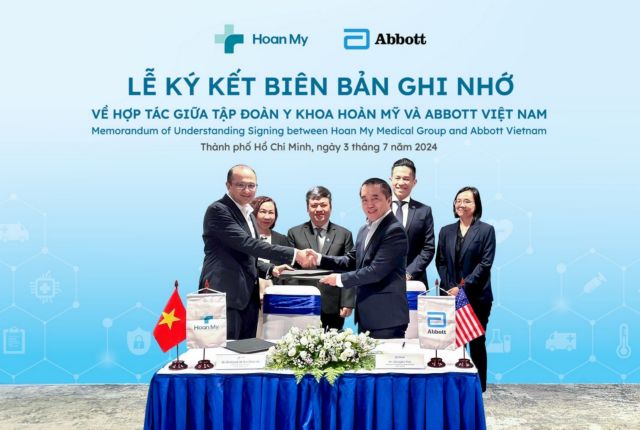Under the MoU, the two companies will partner on comprehensive healthcare solutions to improve the effectiveness of screening and treatment of cardiovascular diseases, diabetes and traumatic brain injuries.

Hoàn Mỹ Medical Group and Abbott Vietnam will coordinate to improve the prevention, diagnosis and treatment of diseases and brain trauma.
The two organisations signed a Memorandum of Understanding (MoU) in HCM City this week.
Under the MoU, the two companies will partner on comprehensive healthcare solutions to improve the effectiveness of screening and treatment of cardiovascular diseases, diabetes and traumatic brain injuries. They will also coordinate educational campaigns to help prevent infectious and chronic diseases.
Dr. Dilshaad Ali Bin Abas Ali, Group CEO of Hoàn Mỹ Medical Group said the partnership with Abbott Vietnam is an important step in our efforts to set the highest standards in healthcare in Việt Nam.
He added that the collaboration will help improve the diagnosis of and effective treatment for non-communicable diseases, which account for over three-quarters of total deaths in Việt Nam.
"Hoàn Mỹ is once again demonstrating that we are committed to investing in technology, facilities, and expertise to raise healthcare outcomes across the country," he said.
To enhance the diagnosis of cardiovascular diseases and prevent the risk of myocardial infarction (heart attacks), Hoàn Mỹ and Abbott Vietnam will implement a cardiac risk stratification programme using the High Sensitivity Tropoin-I RS blood test. This will help doctors diagnose and predict the risk of future cardiac events and make timely treatment decisions.
At the same time, the two will build diabetic care programmes and improve treatment outcomes for diabetic patients through comprehensive cardiovascular risk management, early detection and treatment of diabetic retinopathy. They will also implement joint nutrition interventions for inpatients and outpatients which will help reduce hospital stays, treatment costs and readmission rates.
In addition, they will deploy a Clinical Decision Support (CDS) system, using artificial intelligence (AI) to help the medical team improve clinical management.
Cooperation in public education programmes – specifically for at-risk groups – about infectious diseases that require early diagnosis and chronic diseases, such as heart diseases and diabetes will also be included. — VNS
- Tags
- Hoàn Mỹ
- Abbott Vietnam





